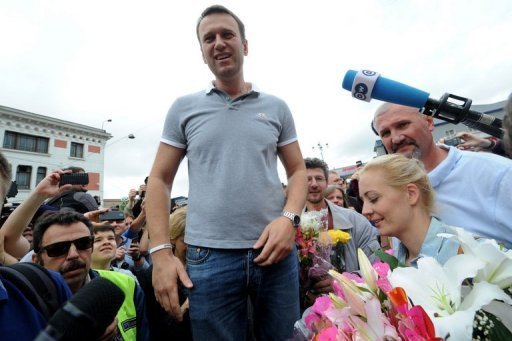AFP
September 6, 2013

Bathed in the rosy dusk of late Russian summer, Alexei Navalny paced the stage as thousands of hopeful young Muscovites waved balloons and clapped at his promises to make a stand against corruption and the Kremlin’s grip on political life.
But then came the most anticipated promise. “I will stop the illegal migration orgy!” Navalny, the charismatic opposition candidate in Sunday’s Moscow mayoral polls yelled, his image projected on a giant screen behind him.
The crowd attending the election campaign rally on a recent weekend erupted with whistles and screams, in what was the biggest and longest cheer of the evening.
The Russian capital will hold its first mayoral elections in a decade on Sunday. And while in 2003, the anti-immigration card was played by one candidate who received under four percent of votes, this year it is the main issue for all six candidates.
Asked in July to list their top five concerns, 55 percent of Muscovites said “too many migrants from former Soviet republics and the North Caucasus”, signalling that migration was their biggest worry, even bigger than rising prices and traffic jams.
Even banners with Sergei Mitrokhin, the candidate from the Yabloko liberal party, which has for years shunned nationalist rhetoric, declare that he is against “turning Moscow into a province of Central Asia”.
Russia’s migration service said last month that one million foreign citizens had been registered in Moscow in the first seven months of the year.
“Unofficial” numbers are usually “several times more”, Moscow prosecutor Sergei Kudeneyev said in March.
Migrant labourers from Central Asia’s impoverished majority-Muslim countries Tajikistan, Uzbekistan, and Kyrgyzstan take up most of the menial construction jobs, work at large agriculture markets, and perform city-financed tasks like street sweeping, road works, and landscaping.
In some districts of the capital, Russians feel like they are a minority, said one municipal deputy from a neighbourhood in eastern Moscow.
“Parents come to me in tears” after finding out that there are only five Russian children in a school class of 26, the local lawmaker, who asked not to be named, told AFP.
“Others are Vietnamese, Azerbaijani, Korean, Armenian, Uzbek, etc,” she said. “They don’t speak, read or write in Russian.” Russian parents are now petitioning to have a “Slavic” school in the neighbourhood, she said.
“People are really concerned about the number of migrants, about their behaviour,” said the deputy, who requested anonymity due to the sensitivity of the issue.
“There are limits to everything, and people have reached the limit of tolerance and assimilation,” she said.
Moscow authorities have recently responded to the growing discontent by raiding garment factories employing illegal migrants and even setting up a special temporary camp for them.
Officials often focus on migrants when talking about crime or drugs in the capital.
Kremlin-backed Moscow mayor Sergei Sobyanin, who is seeking re-election, recently told Vedomosti daily that “half of all crimes in the city are committed by migrants”.
Moscow prosecutors have estimated the number of crimes by foreign nationals at around 10 percent of all solved crimes.
During a high-profile sweep, authorities closed several markets in Moscow after a watermelon seller from Russia’s North Caucasus region of Dagestan punched a policemen in July.
